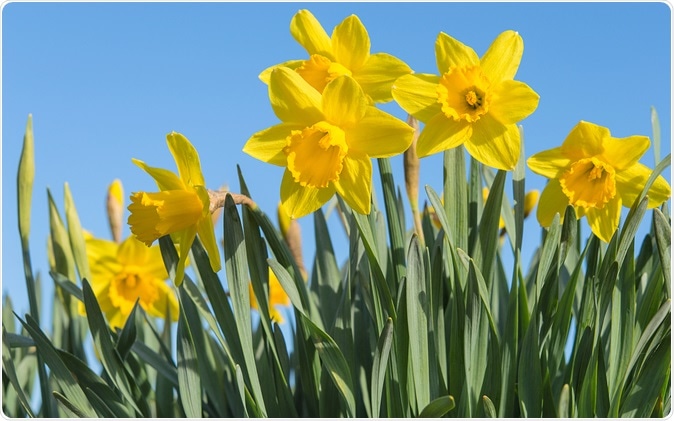
A natural extract from daffodils may help in treatment of cancer find researchers at the Faculty of Sciences at the ULB led by Denis Lafontaine. The team published their research titled, “The Amaryllidaceae Alkaloid Haemanthamine Binds the Eukaryotic Ribosome to Repress Cancer Cell Growth” in the journal Structure that appeared in their latest issue this week.
The team managed to extract a natural anti-cancer compound from daffodils (known scientifically as Amaryllidaceae Narcissus. This compound is called haemanthamine. They then noted that haemanthamine tends to bind to ribosomes within the cells. Ribosomes are microscopic molecules within the cell that help in the synthesis of proteins. As the cancer cells multiply rapidly and spread the cancer throughout the body they depend on rapid and effective protein synthesis. If these ribosomes can be stopped, the protein synthesis comes to a halt and this stops the cancer growth in its tracks so to speak. In this new study the team found that haemanthamine can block the production of the proteins by blocking the ribosomes. They also act within the nucleolus by stopping the production of ribosomes itself. This whole process activates a chain of events called the “anti-tumour surveillance” that essentially gears up to stop the tumor growth. A protein associated with cancers called the p53 protein also is stabilized as a result and this stops the cancer growth and eliminates the cancer cells.
Daffodils have been known for their anti-cancer properties in folklore for centuries in the Greek and Roman ages. They have been used for their medicinal properties in treatment of inflammatory diseases, malaria, viral infections etc. They contain several alkaloids such as galanthamine, lycorine (LYC), haemanthamine (HAE), tazettine and haemanthamine precursor haemanthidine (HAD). This is the first study that analyzes and actually looks at the mechanism by which daffodils could help treat cancer. Haemanthamine is also found in other plants and plant products such as morphine from opium plant, quinine from cinchona tree and ephedrine from plant Ephedra sinica.
The authors conclude that in their study testing haemanthamine and its precursor haemanthidine, they find that these can stop cancer cell division. The effect may not be only due to inhibition of protein synthesis, they write but also due to the activation of the “nucleolar surveillance” and “stabilization of p53”. “HAE and HAD might prove advantageous in cancer therapy,” they write. More studies are necessary to transform these study findings into real anti cancer drugs available for treatment.
Ref : https://www.sciencedirect.com/science/article/pii/S0969212618300091?via%3Dihub
